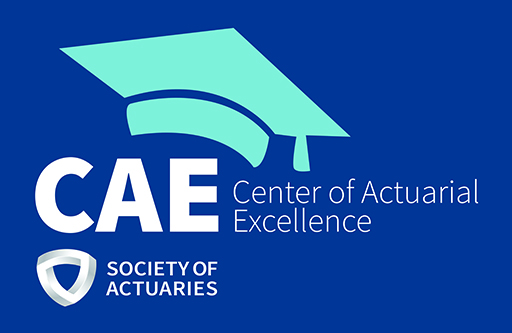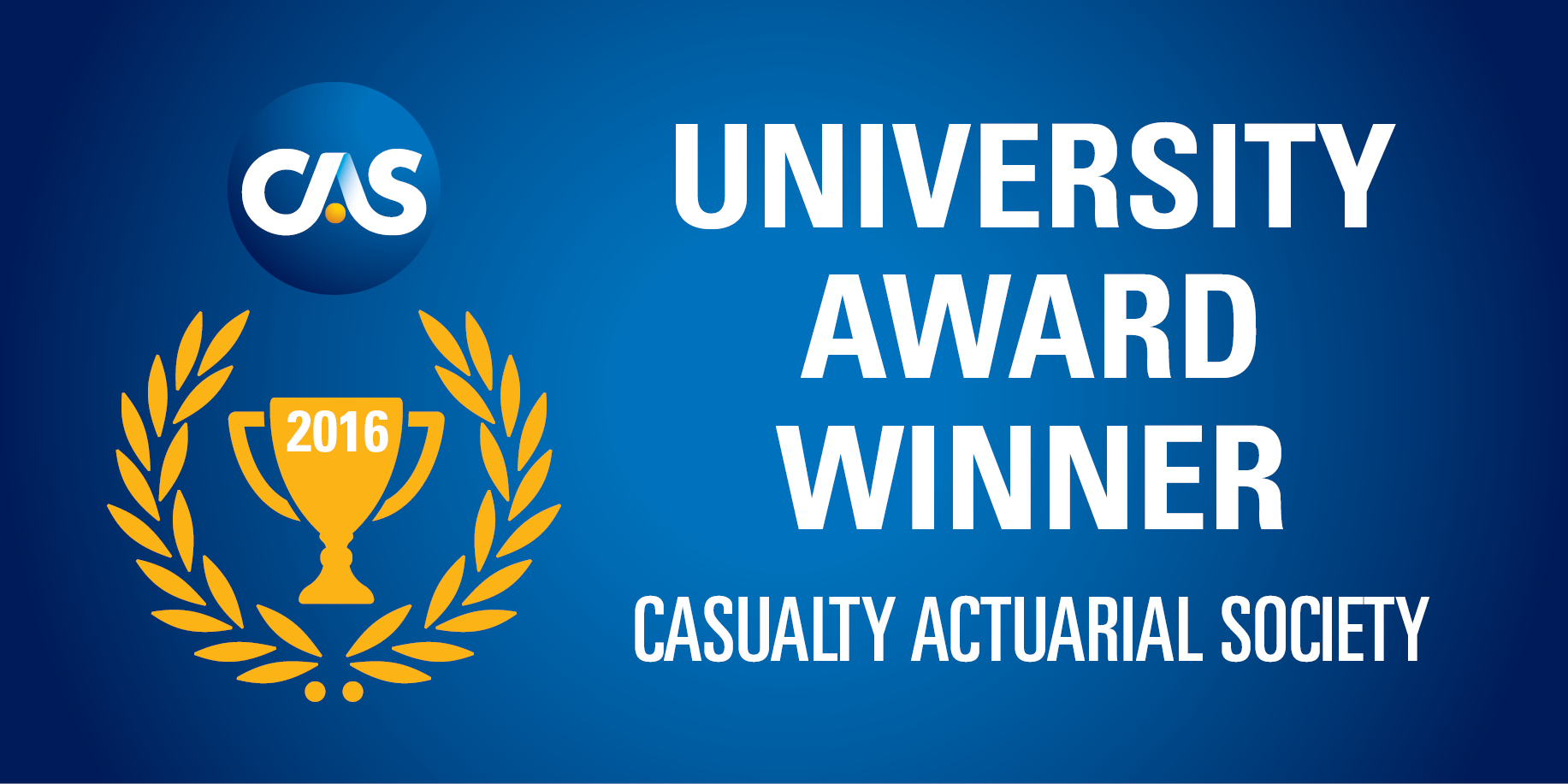Introduction
(Note: This is a program description only for students enrolled before Fall 2018. The page for students enrolled in Fall 2018 or later is here.)
This M.S. program in Mathematics with concentration in Actuarial Science aims to prepare  students for careers as practicing actuaries in the insurance, pension, financial or consulting industries. The M.S. program is completely inappropriate for students intending to pursue academic careers in research and teaching. Such students should pursue a Ph.D. for which this M.S. program provides no meaningful preparation.
students for careers as practicing actuaries in the insurance, pension, financial or consulting industries. The M.S. program is completely inappropriate for students intending to pursue academic careers in research and teaching. Such students should pursue a Ph.D. for which this M.S. program provides no meaningful preparation.
The M.S. program offers coursework encompassing almost all of the subject matter for the first five professional examinations of the Society of Actuaries and Casualty Actuarial Society allowing students flexibility to focus on the particular material for which they are ready. These courses provide rigorous academic coverage of the material and are not specifically aimed at exam-prep, which is the student’s own responsibility. The program offers elective coursework meeting all of the Validation by Educational Experience (VEE) requirements of the two professional societies. In addition, advanced coursework in Statistics, Finance, Investing,  Accounting and Economics is available. Students typically complete the degree in 3 or 4 semesters of full-time study and a few do it in 2 semesters. Rarely, a student completes the program on a part-time basis, which takes longer.
Accounting and Economics is available. Students typically complete the degree in 3 or 4 semesters of full-time study and a few do it in 2 semesters. Rarely, a student completes the program on a part-time basis, which takes longer.
Students do well in this program if they enter with a high GPA bachelor’s degree in mathematics, statistics, physics, engineering, quantitative economics, or other related fields and want a career applying their already strong mathematics skills and knowledge to the understanding and solution of problems involving risk and the financing of risk. No prior knowledge of actuarial science, business, finance or investing is required but the mathematics background is essential. We expect applicants to have completed undergraduate coursework in differential calculus, integral calculus, multivariable calculus, differential equations, linear algebra and mathematical probability/statistics (taught in a calculus framework). If one of these is missing it can be made up upon enrollment, but usually an applicant’s background should be missing no more than one of these.
In addition to the Graduate School requirements for admission: We want three recommendation letterss, preferably from mathematics instructors. GRE quantitative section scores for those we admit average at about the 95th percentile, and rarely fall below the 90th percentile. Undergraduate GPAs for those we admit average about 3.5/4.0 for quantitative coursework.
For international student admission, TOEFL scores of 55 or more in the total of the Reading and Listening scores are preferred; teaching assistantship, when offered, requires either 28 on the Speaking score, or 23-27 plus passing UConn’s microteaching test.
Students with extensive prior actuarial study may be better served going directly into their careers rather than into this degree program. There are no actuarial jobs outside of academia that require any actuarial degree or any advanced degree of any kind. Actuarial professional exams are designed specifically with self-study in view. While most students are recent graduates, we also welcome returning students who wish to upgrade their skills to enter a new career or advance with their current employers.
For the admissions process see Admission. In the online application, apply for M.S. in Mathematics, concentration in Actuarial Science.
See M.S. in Financial Mathematics – Actuarial Science for the alternative of choosing an actuarial science degree offering more practicum experience in a 30 credit degree program.
The M.S. in Mathematics concentration in Actuarial Science qualifies as a STEM (Science, Technology, Engineering, Mathematics) degree with the federal government. Foreign students who earn the degree may be eligible for the STEM extension to the OPT (Optional Practical Training) program, allowing a total of 29 months of post-graduation employment in the U.S.
More on our actuarial program can be found on its homepage.
Overview of Requirements
(Note: Requirements below are only for students enrolled before Fall 2018. Students enrolled in Fall 2018 or later need to look here.)
To graduate with an M.S. in Mathematics, concentration in Actuarial Science, a student must satisfy all of the following requirements:
- For those admitted for Fall 2017 and before Fall 2018: At least 30 credits, including at least 4 of the core courses below.
- For those admitted before Fall 2017: At least 24 credits, including at least 4 of the core courses below.
- Two qualifying examinations (offered each August and January), which can be waived by passing two Society of Actuaries (SOA) exams or Casualty Actuarial Society (CAS) exams.
Coursework
(Number of credits, and semester, F or S, course is usually offered in.)
Core Courses:
SOA exam connection and VEE credit are indicated where applicable.
At least four of:
- Math 5620: Financial Math I – Theory of interest (3 F S) – connection to Exam FM
- Math 5650 (formerly MATH 5621): Financial Math II – Theory of Corporate Finance (4 F S) – credit for Corp. Fin. VEE
- Math 5660: Advanced Financial Math – Stochastic Finance (3 F S) – connection to Exam MFE
- Math 5630: Actuarial Math I (4 F) – connection to Exam MLC
- Math 5631: Actuarial Math II (4 S) – connection to Exam MLC
- Math 5633: Survival Models (3) – connection to Exams MLC and C; not offered in recent years
- Math 5637: Risk Theory (3 F) – connection to SOA Exam C and CAS Exam 3
- Math 5640: Advanced Topics in Actuarial Math I – Model Construction (3 F) – connection to Exam C
- Math 5641: Advanced Topics in Actuarial Math II – Credibility Theory (3 S) – connection to Exam C
- Math 5661 (formerly MATH 5800-005) Yield Curve Models (3 S) – some connection to Exam MFE
- Math 5800-043: General Insurance: Pricing and Reserving (3 S) – connection to CAS Exam 5
Elective Courses:
Select additional courses from the required list, and/or select from the following (no more than 6 credits of undergraduate courses 3000+ can be credited towards the MS degree):
- Math 3170: Elementary Stochastic Processes (3 S) – connection to Exam C
- Stat 3965: Elementary Stochastic Processes (3 F) – equivalent to Math 3170
- Math 3545: Actuarial Case Studies Using SAS (1 F S)
- Math 3621: Actuarial Statistics (3 F S) – credit for Regression Analysis VEE and Time Series VEE
- Math 5635: Simulation (3 S) – connection to Exam C, not offered in recent years
- Math 5600 (formerly 5800-018): Fundamentals of Financial Math (3 F) – some connection to exam MFE
- Math 5670 (formerly 5800-030): Financial Programming and Modeling (3 F S)
- Math 5671 (formerly 5800-031): Financial Data Mining with Big Data (3 F S)
- Math 5850: Graduate Field Study Internship (1-3 F S Summer) – may be repeated for credit, but no more than 3 credits can apply toward the degree requirement
- Math 5110: Introduction to Modern Analysis (3 F)
- Math 5111: Measure and Integration (3 S) – consult advisor first
- Math 5160: Probability and Stochastic Processes I (3 F) – consult advisor first
- Math 5161: Probability and Stochastic Processes II (3 S) – with permission
- Acct 5121: Financial Accounting and Reporting (3 F S) – strongly encouraged, but not required
- Acct 5327: Financial Statement Analysis (3 F S)
- Fnce 5202: Investments and Securities Analysis (3)- usually Hartford campus
- Fnce 5504: Options and Futures (3) – usually Hartford campus
- Fnce 5512: Fixed Income Instruments (3) – usually Hartford campus
- Fnce 5151: Introduction to Economic Markets (3) – usually Hartford campus – credit for Microeconomics VEE and Macroeconomics VEE
- Stat 5361: Statistical Computing – Large Financial Models (3 S)
- Stat 5585: Mathematical Statistics I (3 F)
- Stat 5685: Mathematical Statistics II (3 S)
- Stat 5505: Applied Statistics I (3 F)
- Stat 5605: Applied Statistics II (3 S)
- Stat 5315 or 3115: Analysis of Experiments (3 F S) – credit for Regression Analysis VEE
- Stat 5725: Linear Statistical Models (3) Credit for Regression Analysis VEE
- Stat 5825 or 4825: Applied Time Series (3 F S) – credit for Time Series VEE
- Econ 5201: Microeconomics (3 F S) – credit for Microeconomics VEE
- Econ 5202: Macroeconomics (3 F S) – credit for Macroeconomics VEE
- Econ 5301: Mathematical Economics (3 F)
- Econ 5311: Econometrics I (3 F S) – credit for Regression Analysis VEE and Time Series VEE
Please also consult Hartford Campus offerings for many of the above courses. Enrollment in the Hartford Campus can be made only by arrangement with the Applied Financial Mathematics program director in the Mathematics
department.
There are some undergraduate courses of interest to some master’s students and in which they can enroll when seats are available (ask instructor), but these courses are not eligible to be included in the M.S. degree requirement:
- Math 3160: Mathematical Probability (3 F S) – probability for undergraduates
- Math 3610: Financial Mathematics Problems (1 F S) – Exam FM prep for undergraduates
- Math 3550: Programming For Actuaries (3 F S)
- Econ 1200: Principles of Economics – Intensive (4 F S) – credit for Microeconomics VEE and Macroeconomics VEE – enroll directly, no permissions needed
- Econ 1201 or Econ 2201: (3 F S) – credit for Microeconomics VEE – enroll directly no permissions
- Econ 1202 or Econ 2202: (3 F) – credit for Macroeconomics VEE – enroll directly no permissions
Actuarial Exams
In order to graduate with a master’s degree, two of the mathematics department’s preliminary Ph.D. qualifying examinations must be passed (administered each year in August and January). Alternatively, passing grades on two exams of the Society of Actuaries or the Casualty Actuarial Society provide a waiver to the department qualifying examinations and is the preferred method to meet this requirement.